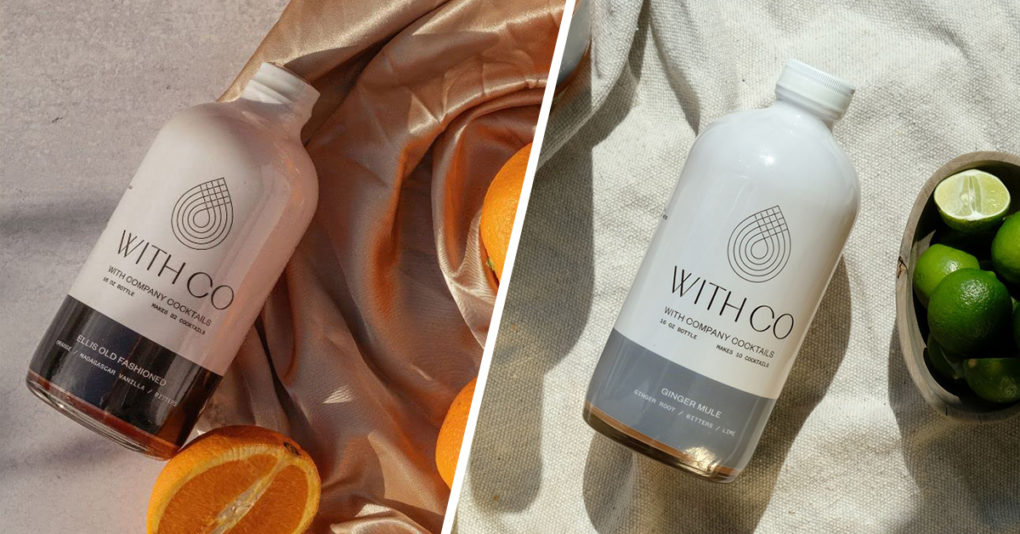
Like other brands that found a niche during the pandemic, that viral moment jump started WithCo’s growth. But it also put the business on an unsustainable path— one that the founders had to correct by shifting its channel focus and making difficult spending decisions.
“There’s nothing worse—and it’s a two edged sword—when a company has a viral moment and they get through it, but then they spend countless weeks, months, and years and money trying to recreate those moments,” said co-founder Joshua Ellis.
Ellis and his partner Bradley Ryan started their now nine-SKU line of clean ingredient, fresh juice and botanical-forward non-alcoholic mixers in 2017, but after Ellis quit his full-time real estate job, things started to scale quickly. A surge of demand in 2020 meant the founders could hire friends and family to help pack boxes and keep up with hundreds of orders transforming what was once a mostly backyard pop-up. Demand has continued, but the business plan has since matured; WithCo can be found on the shelves of major retailers, and announced a partnership and investment from musician Dierks Bentley this month.
But none of that would be happening if the founders hadn’t reassessed their business goals. After several family and friend raises over two years amounting to about $1 million, Ellis wanted to steward the business into a different business model.
“I had to unsubscribe to the idea that building a beverage company means burning cash and raising money until somebody buys it out,” he said.
The E-Commerce Pivot
When the founders formally launched in April 2020, the brand’s first digital ads were making $10 per every $1 spent. Building on that conversion rate, sales were 99% e-commerce going into 2021. That was the biggest shift the founders first had to contend with as the world opened back up.
As Ellis anticipated the need to diversify the company’s revenue streams, he went the route of a traditional spirit company and partnered with one of the industry’s biggest distributors, Southern Glazer’s.
“Like a spirits brand would, we signed with a distributor and then just hired people in all the markets where we were focused, and we really over-leveraged the company without a lot of funds,” he said.
When e-commerce sales began to dip, the founders realized their expenses were too high and they decided to “scale back and get healthy.” But where to start?
Ellis refocused the company on “controlling the controllables” versus chasing after another viral moment, he said. They cut all advertising (a policy which still stands today) and shifted focus to finding the most bang for their buck going after retail and hospitality channels. Supporting sales teams to support their spirit distributor wasn’t working.
“The first people to go were the ones that were out in these markets that we just can’t get traction in,” he said.
Finding a path forward came with some pain: the founders made the difficult decision to lay off 80% of the company, starting with sales reps. The time developing reps was too costly, added Ellis, and instead of keeping five, the company hired one person who had expertise with retail and grocery. That also came after taking a step back to re-evaluate and focus on the brand’s demographic, which skews towards a female conscious consumer more likely to discover the brand at a natural retail and grocery store than a liquor store. That’s panned out with placements at Target and Sprouts nationwide, though at a cost.
“In scaling back we were diminishing our own topline revenue,” he said.
The company was saving money as it “stopped spending unhealthy advertising money,” but revenue was declining just as the business was struggling to fund its first retail orders. While cutting any other unnecessary expenses, rebuilding the business felt like going out of business, he said.
“But I think it’s great for founders to take a step back and ask, what is the most important even if it doesn’t feel right? Is it a hard season I need to go through to end up in a more healthy place?” he asked.
The business is now profitable. WithCo has also found another channel by putting the product in a larger 750 ml bottle and working with sports stadiums, Disneyland, hotel groups, and other places that are streamlining their cocktail programs. In a similar strategy to retail channels, they’ve hired sales agency First Step Beverage and invested in one role that is going after corporate requests for proposals.
“The goal is how can we find scalable, sustainable growth?” he said. “And the best way to do that for us is working with accounts that we solve a problem for and add lots of value.”